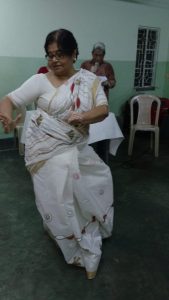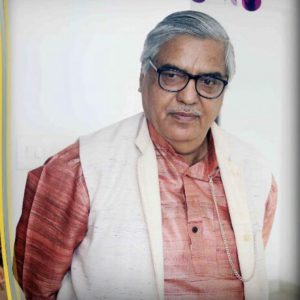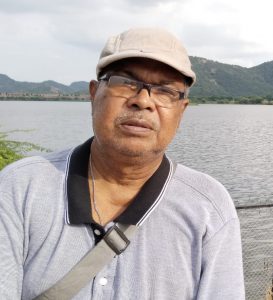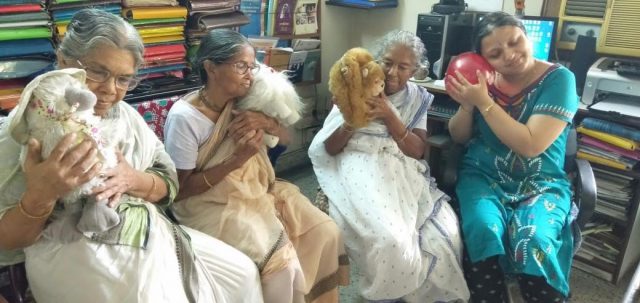India has 110 million elderly, projected to become 177 million by 2025. Of this West Bengal has 750,000 senior citizens and Kolkata itself records 550,000 of them. In a recent research study the Calcutta Metropolitan Institute of Gerontology (CMIG), Regional Resource and Training Centre on Ageing, conducted individual case studies to explore how senior citizens were coping during the pandemic.
The case studies revealed stories of anxiety, detachment and especially pain of being physically separated from their off springs for parents of NRIs (non-resident Indians). The research findings also elucidated their undeterred spirit and determination driving them to form closed groups, practice their unexplored hobbies, master new techniques and digital skills they never imagined they would use, and respond to changes to best of their abilities. Their stories of resilience and strength has never been better.

Senior citizen Mala Ghosh lives with her husband and has no children. She indulges in a host of activities to stay engaged but the pandemic restricts her to meet her friends making her isolated. To cope with isolation, she regularly practices dance at the age of 67 and teaches her peers through Skype. CMIG concludes that performing arts is an outstanding therapy which works not only with senior citizens suffering from dementia, depression and terminal diseases, but also with healthy senior citizens who aim to optimise their ageing experience. Mala Ghosh’s use of dance as a therapy also validates the theory that ‘productive ageing’ is an effective method to vanquish negativity.
Susmita Chowdhury, a senior citizen, widow with children living in Boston and Perth could not travel to see her children and the pandemic snatched her son’s job. She misses comforting him during these hardships but using video conferencing, she reaches out to strengthen his spirits. Her agony was enhanced by death of her brother and his housing association prevented outsiders’ entry for last rites. Susmita stayed calm and said goodbye through Zoom. CMIG found that the economically strong elderly could adapt to changing situations better than poorer counterparts and in Susmita’s case her exposure, family background, life experiences made her cope with confidence and grace.

Senior citizen KP Bhattacharya could not travel to meet his daughter in Canada. His wife is depressed only being able to touch her granddaughter through laptop. Human touch of younger generation is invaluable for fuelling the spirits of elderly. But KP Bhattacharya exploits the pandemic as an opportunity and regularly updates himself with digital skills like paying bills online, internet banking, using apps for ordering food or medicines. He has also formed WhatsApp groups to share knowledge with friends who are struggling with the same. This case study shows that due to declined cognitive abilities elderly can take more time to learn, but it is achievable. It also showcases the importance of peer teaching or ‘elder to elder’ teaching which makes senior citizens identify their problem areas in learning and approach them in a way that is best suited for them.

Retired army officer Subhash Majumder has his NRI daughter-in- law and grandchild stranded in Kolkata. During his service in the army, he used discipline to effectively handle odd situations. In pandemic, he is again finding discipline instrumental to keep him happy and active. Indoor exercises, healthy meals, practising yoga or meditation-routinised lifestyle keeps him on track. He spends several hours doing playful activities with his granddaughter and in his case, discipline and intergenerational bonding are fundamental to his wellbeing.
CMIG Secretary Dr. Indrani Chakravarty observes that lifestyle changes for pandemic has been overwhelming for senior citizens. Disintegration of joint families which was the best social security make them live alone or with their spouses in urban settings. “Trained caregivers, domestic help, therapists are not being able to reach them but community, students, natural helpers, neighbours are coming forward depicting a transition from formal to informal care in these trying times,” he said
Geriatrician Dr. Indranil Maitra admits that the elderly are highly vulnerable to COVID-19 and it is strongly encouraged that they pursue hobbies, share experiences with peers, and stay closely knit alongside regularly monitoring their vitals. “Adjusting to changes can be hard in old age, but maintaining a sound psychological health and building positive energy are gateways to staying prepared for unusual challenges,” he advised, as he concluded.

Esha Chakravarty
Esha Chakravarty is a London based cancer scientist researching on targeted therapy and antibody drug development in ovarian cancer. She is a visiting researcher and guest faculty of Calcutta Metropolitan Institute of Gerontology, India and have been working on issues of the elderly over the years. She also practices dance psychotherapy in agecare and terminal illness as part of her research.





![Powerful Pride documentary Legendary Children [All Of Them Queer] streaming very soon](https://globalindianstories.org/wp-content/uploads/2025/06/Legendary-streaming-release-featured-100x75.jpg)

